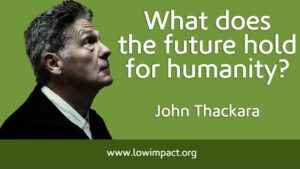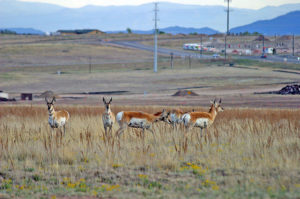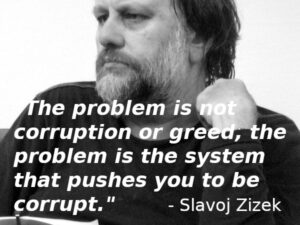12 reasons why people refuse to address the idea that we’re headed for near-term societal collapse

The starting point for a generative discussion of the deep adaptation agenda is a difficult one. Because to begin to rigorously and imaginatively discuss this topic first requires us to accept the likelihood of near term societal collapse. By which I mean that within ten years, in whatever society we are living in, we will find ourselves in a situation where our normal means of income, sustenance, security, pleasure, identity and purpose all disappear. As it is impossible to predict the future within complex systems, “ten years” is not my prediction, and I mention it as a device to help focus this discussion without making people run out of the room to stock their bunker. Please note that I am not suggesting we have the whole ten years: we might have less than that. Haven’t a clue about what I am talking about? Then please read my paper on Deep Adaptation.
As I have been talking with people about this topic over the past few years, I’ve become aware of the barriers accepting near-term societal collapse and therefore barriers to rigorous and creative thinking and discussion about what we might do about it, personally and collectively. I have also become aware of the barriers I had for a few years to avoid addressing this topic with the seriousness it merits. So before outlining either the analysis of our environmental predicament or the new agenda this opens up, it may be useful to outline some of these barriers to useful dialogue. I do that as part of my invitation for you to either avoid – or momentarily suspend – such responses and adopt a “what if” perspective on societal collapse. Only then can one explore what a deep adaptation agenda might mean for oneself, one’s work and wider society.
I am not a psychologist. I presume there is a lot of psychological theory related to what I am perceiving when I discuss climate-induced collapse. Some theories like confirmation bias, wilful blindness, cognitive dissonance and the relatability of new information are ones that have reached me via the mainstream. But rather than attempt a poor hack of psychological theory to validate or explain my perceptions, I will instead share a purely layman’s perspective of the attitudes and responses I have encountered. I will therefore leave it to psychologists to come to my aid in elaborating on these experiences. In the following discussion, I may also be exhibiting certain fallacies that psychologists could point out for me. Any feedback is welcome (in the comments below). For ease of future discussion, I will label each of the following twelve types of dialogue-barring response with a somewhat catchy title.
The “Problem Person” Response
The first response that is a barrier to discussing deep adaptation is an “ad hominem” response, where we question the credibility of the person sharing the analysis. It is a response we all have when confronted with uncommon views. Is he credible? Is he an expert? Is this view widely shared? These are obvious and important questions to ask but should not mean you avoid looking at the evidence yourself. Therefore, when asked that question, I suggest people read the summary of climate science and current measurements, in the first part of my Deep Adaptation paper.
The “Objectifying” Response
The second response that is a barrier to generative dialogue on this topic is to label the analysis of collapse as just one type of analysis amongst many. This approach sometimes includes expressing how apocalyptic thinking is a cultural trope throughout human history. This means that one can feel one has a broader perspective of a range of different views held by different people and organisations. Therefore, the emotional charge of the analysis of near-term collapse is reduced. One’s worldview is maintained, including the view that one is a reasonable balanced person operating sensibly within a reasonable balanced society. The problem with this perspective is you are choosing to “sit on the fence” on the most important matter in your lifetime.
The “Polite Avoidance” Response
The third response that is a barrier to generative dialogue is to renegotiate for yourself what I am saying. It’s a polite conflict-avoiding form of response. It is where you might choose to focus on what you think is the useable bit of what I’m saying, where you conclude that things are very bad and therefore we need to increase our efforts to stave off collapse. But that’s not what I’m saying. I’m saying societal collapse is now inevitable within, probably, the next ten years. And I’m using the concept of “inevitable” because even if there is a eureka technology right now that is deployed at scale to take carbon out of the atmosphere, the heating that’s pre-determined from existing atmospheric CO2 plus the escalating feedback loops means societies will collapse anyway.
The “Moral Superiority” Response
The fourth response that is a barrier to generative dialogue on this topic is what I will call the “moral superiority” response. It is when people ask “is he being irresponsible for expressing this view?” The supposition made, most often without evidence, is that it will make people panic or become apathetic, and therefore we shouldn’t even be discussing it. Yet silencing our own thinking and discussion because of speculation on what this might do in the wider world is an illogical way of thinking. It is a response that I examine in my Deep Adaptation paper and contrast with the evidence from worldwide opinion surveys that suggests more people are becoming doubtful about the future. This objection often comes with accusations that people like me are “giving up” and irresponsibly implying everyone should “give up.” That is often said rhetorically without specificity of what exactly we are giving up on. Therefore, such statements reflect an annoyance a person is experiencing when hearing the idea of collapse. I am suggesting people give up efforts at the incremental reform of existing systems. I am suggesting people give up on any dependence on the status and security associated with their current way of life. I am suggesting people give up on assuming their lives have meaning by contributing to progress. I am suggesting people give up on postponing their attention to their own mortality and the meaning of life. I am not suggesting we give up on carbon reductions or active engagement in society. Quite the opposite. Many things can be discussed, as a result of this switch in thinking.
The “Postpone Judgement” Response
The fifth response that is a barrier to generative dialogue on this topic involves thinking to oneself that it might be true, but to know for sure then I’d have to really study and think, and I am too busy right now so will aim to analyse this later. Being busy is comprised of so many things. We could be having so much fun, or having invested so much of our time, money and spirit into a project that hasn’t yet succeeded, know we want to have the fun we haven’t had before looking at this topic more. Why? Because we sense that looking more closely at near term societal collapse risks disrupting everything we think about ourselves, the world and all that we have worked towards. The problem is that while one postpones, a subconscious panic can set in as more information about our current situation passes across our screens. Yes, I speak from experience on that one!
The “Fairy-tale” Response
A sixth response that is a barrier to generative dialogue on deep adaptation arises from a belief that we create the reality we experience, so we can help avoid a collapse by imagining something else. Within an individualistic framing, there is positive psychology, whether the moderate kind that involves believing ‘where the attention goes so energy flows’, or the extreme kind, where people want to believe in their own cosmic power to manifest anything they want by focusing their desire. Such a view ignores how we co-create our reality with other people and the more-than-human world. It stores up greater pain for when things don’t work out according to one’s hopes and dreams. It might also restrict people from applying their minds to the world as it is now. A different version of this “fairy-tale” response to the latest climate science is the idea that so long as we identify with a new story of reality, beyond separation, we will be able to overcome a climate catastrophe. Although our current climate predicament is the result of a warped story of reality and place within it, the idea that by identifying with a new story of inter-being we can reshape the world around us to avoid a collapse seems like wishful thinking. It may also be seeking to justify a view on reality and metaphysics by arguing for the utility of that view to an individual self – a highly seductive trap for spiritual teachers and their followers.
The “Not Bothered” Response
The seventh response that is a barrier to generative dialogue is to think that because this analysis means it’s too late to fix things and maintain society as we know it, we therefore “may as well” just forget about climate change and do something else. In my experience, this view is shared by people who are not actively participating in society beyond their own self-interest. They may have accepted socially-defined notions of success and seek to avoid pain and maximise superficial pleasures. Therefore, they are not likely to contribute much to dialogues on social change in any case. So, we could let them go on their way. But sometimes I hear people express this view because they are angry at the injustice and inequality in our societies and could welcome how collapse will punish elites. When I hear that, then there is an opportunity to channel that anger at injustice into something more useful, given that it is the poor and marginalised who may suffer the worst in early stages of collapse.
The “Distract-Me Please” Response
An eighth response is to take on board the view that we face inevitable near-term collapse and decide one can’t live with the emotions this causes, so set it aside and work on something else, as if it didn’t exist. That is understandable, but impossible. I know, as this is how I responded for a few years. As more and more information is shared about the state of our climate and impacts on our agriculture and societies, the unresolved emotions lurk ready to interrupt your work and life.
The “God’s Will” Response
A ninth response that is a barrier to generative dialogue is to say yeah, I know we’re screwed, and that’s OK, as our true nature is eternal spirit and therefore the end of society, civilisation, even our species, is just the normal passing of things. Such a perspective means you might say let’s take a deep breath in together and chant Om, then go get a green juice or glass of red wine. Another form of this response that is more likely in cultures shaped by Abrahamic religions (Christianity, Islam, Judaism, Bahai) is that whatever is going to happen to our species is God’s will, and therefore we don’t need to discuss what to do about it.
The “Personal Survival” Response
The tenth response I have experienced over the years is to take the analysis of collapse on board and then let the fear-response shape one’s priorities and decisions, so begin to look for means of self-preservation. Many people with that kind of response think they are fully accepting the situation and integrating it into their lives. But being a “prepper” in the complex system of human society within the wider complex system of nature means that this kind of “bunker mentality” is unlikely to work. Not that we shouldn’t look to create arks.
The “Extinction Wins” Response
An eleventh response to generative dialogue on deep adaptation is the view that near term human extinction is inevitable or very likely. Some people with such a view consider any discussion about what to do to reduce the impact of collapse, save the species, or support what might come after this civilisation is gone, are all forms of deluded hope. That one thinks human extinction is inevitable would not necessarily preclude working on the things I just mentioned, as one can act as if it might still be possible to achieve such things, just in case it is. Or, it might even be possible to accept human extinction and seek to reduce the radioactive legacy we would leave the rest of planet Earth. Those who dismiss any such dialogue are therefore likely trying to find solace in certainty, rather than reconsider everything and consider being active in society.
The “Nit Picking” Response
Rather than deal with the gravity of the analysis, the twelfth barrier is to focus on a detail of communication. For instance, a mistake in a piece of data, or a reference, or annoyance at the tone or content of one’s utterance. Or perhaps focusing on the lack of depth of discussion in one paper on one set of ideas – from permaculture to geoengineering – which are seen as the be all and end all of what should be discussed. This is milder than an ad hominem attack, but helps someone engage with the material without engaging with the significance of the material and thus avoiding meaningful dialogue on deep adaptation. I left it until last in my list as this response is such a boring one, I find it draining to even mention.
Beyond Those Barriers: The Power of “What If?”
These twelve types of response all share the implication that we don’t have to sit with the analysis of near term collapse and explore openly with others all the possible implications. I think these forms of response may therefore all respond to the subconscious desire to close down this awkward topic as quickly as possible. But I’m not a psychologist. So, to any psychologists reading this, if you can add any context to the ideas I have outlined that could help me (and others), then any advice for how to help people awaken to such patterns and move beyond them would be great. Also, if I’m exhibiting a pattern as well, then do let me know
If people avoid or overcome the twelve barriers I have described, to then discuss the components and implications of a deep adaptation agenda, or similar, then this doesn’t mean people will agree with each other. Not at all. Some may turn to religion. Some to nationalism. Some to principles of universal love and compassion. Some may focus on geoengineering. Others on humanitarian action. Some on moving beyond capitalism. And so on. But that’s what our dialogues should be focused on now. Sadly, our dumbed-down establishment-aligned media still think it is best to debate whether climate change is real or associated with extreme weather events that, by repeating regularly, show how the climate has changed.
In future I will write more about some avenues for discussion, for those who want to seek meaning, potency and urgency within a context of impending collapse. But my conviction is that once people overcome the twelve barriers I have just described, then hopefully many better views on what to do than my own will begin to emerge.
The views expressed in our blog are those of the author and not necessarily lowimpact.org's
31 Comments
-
1Steve tiller September 2nd, 2018
What a great read..
-
2Steve Gwynne September 2nd, 2018
Look forward to more. Thanks
-
3John Harrison September 2nd, 2018
I can only speak for myself on this – my attitude is that it’s an event I’m very unlikely to survive being neither young nor in robust health. If it’s inevitable then there is nothing I can do but hope it never happens. So, I’m in denial.
Besides, people have been threatening the end of the world as long as I’ve been alive. Pesticides, nuclear war, ice age coming, super-hot climate change, etc., etc. So far, so good! However, I’m enjoying my training films for the zombie apocalypse like The Walking Dead. ?
-
4Malcolm Purvis September 2nd, 2018
Very interesting. It seems to many that societal collapse could come any day from economic collapse, this doesn’t seem to really be tackled in this paper? The governor of the Bank of England said last year that our banking system is in crisis, we seem to have limped along until now but for how much longer? All the talk of societal collapse seems a bit surreal and difficult to comprehend but surely it must be best to talk about it and consider the options/strategies than to just go into denial or any of the other psychological responses mentioned. Keep up the good work.
-
5M Brookman September 2nd, 2018
Yup. As a parent, a communicator, a social entrepreneur, a feral economist and systems thinker who has been working in similar fields to the author up to now … I recognise all these and am absolutely sure I have fallen prey to some. Currently in a necessary emotional turmoil having read the D.A paper a month ago. The turmoil is indeed absolutely necessary. Thanks, Jem. Don’t stop now. You’re carrying the fire.
-
6John Harrison September 2nd, 2018
The more I find out about economics and money, mainly from links followed from this web site, the more I realise it’s a fantasy land based on belief. I believe the computer screen telling me I have £1000 pounds or even I believe a thousand bits of paper with pictures of the queen on them are worth £1000 but I don’t know what a pound is. Except that others who believe in pounds will swap them for things I want.
Back ten years ago when the banks were failing, what happened? Some authority produced more of these mysterious (or should that be mythical?) pounds and pumped them into the economy.
So I don’t see a reason to worry about economic collapse since it’s based on computer digits which are infinite in number. They’ll just shuffle things about to stop it happening. The big banks are too big to be allowed to fail – which sort of proves capitalism has failed although it’s a walking corpse at the moment that people think is healthy.
The real threat (apart from asteroid impacts and plague) is less food being available than needed to support a population that’s headed up and up. We’ll cope with climate change storms – that might even stimulate the economy and cause a war boom – but when it kills off staple crops like rice or wheat is when the real trouble arrives.
Even then it won’t hit overnight or collapse our society, things will go downhill over a period of time. We lucky rich people in the world will buy up the food that the poor people need to live on – and they don’t have the power to stop it. There’s a lot of slack in our system and even when that has gone there are still options like rationing to avoid riots in the streets.
So I don’t see a fall off the cliff, just a nasty slope downhill. Quite how long to hit bottom is the question to worry about.
-
7Andrew Rollinson September 4th, 2018
I suggest another reason: they are fooled into believing the comfortable illusion that “sustainable development” is possible, which according to your website you teach and promote. It is an oxymoron.
-
8Dave Darby September 4th, 2018
Andrew – we don’t teach or promote ‘sustainable development’ – especially as the word development is often associated with growth.
We ‘teach and promote’ that we’re headed for ecological catastrophe – https://www.lowimpact.org/lowimpact-topic/the-nature-problem/;
that this can’t be avoided as long as the economy is constantly growing – https://www.lowimpact.org/lowimpact-topic/steady-state-economics/
that lifestyle change is necessary but not enough to turn this around – https://www.lowimpact.org/environmental-groups-lifestyle-change-isnt-going-enough-avert-ecological-catastrophe/
and that we need to replace capitalism with a stable economy that doesn’t concentrate wealth – https://www.lowimpact.org/lowimpact-topic/low-impact-economy/
This is what we want to achieve – https://www.lowimpact.org/achieve/. It’s about as far from the generally-accepted idea of sustainable development as you can get.
-
9Andrew Rollinson September 4th, 2018
Not you Dave. I am referring to the author of this article – Jem Bendell, and his academic web profile.
-
10Dave Darby September 4th, 2018
Ah, sorry, crossed wire.
-
11Carolyn morton September 10th, 2018
Not sure how i got to Jem’s website and ideas, but it’s been a good few months of livng with a growing unease that i can’t ignore this reality.
Currently ploughing through Deep Adaptation Agenda whilst trying to clarify what my day-to-day priorities are and how they might shift.
And learning to be careful about who and how i speak about this.
It’s a genie that grants no wishes.
-
12Dave Darby September 11th, 2018
Carolyn – you may not be able to ignore this reality, but it seems that the media and politicians can. Every news item on Radio 4 about the economy is from the perspective that climate change either isn’t happening or isn’t important. It’s really, really weird, and makes me wonder if I’m living in the same reality as them.
‘a genie that grants no wishes’ is genius, btw.
-
13Theresa Munson September 11th, 2018
I was talking to a colleague about this today, both of us expecting it. But even accepting that society will collapse, it’s the uncertainty about what will actually happen after, what will replace how we live now. We’ve all seen the post-disaster movies and it’s a terrifying prospect to be faced with. Most people feel desperately small and helpless in this world and unable to believe that any action they take will make any change, which is why they react in any of the ways mentioned above.
-
14carolyn morton September 11th, 2018
Theresa Munson Jem’s article is rooted in the evidence that nothing we do (or could do) will change the outcome. Mortality pulled into sharp focus.
I’m going to start reading some of the support resources he’s linked into the article.
Actually the thing that has helped me most over the past few months is going to my allotment/ wild garden and spending time getting to know what’s there and how to support / diversify it. There are birds and trees, fresh air and lots of horsetail … a prehistoric plant that continues to thrive
-
15Theresa Munson September 13th, 2018
Carolyn Morton, I understand that and that the only real preparation we can make is to try to mentally and physically brace ourselves for the impact of whatever is coming. But feeling small in a vast universe is what has driven people for millennia to religion, superstition, safety in conforming with the business as usual mentality. It’s hardly surprising that they react in the ways described because most never coped with the difficulties of existing and dying in what were apparently ‘normal’ times.
I personally think we have to face this in the same way we would, if we were given the news we had a terminal illness and make the most of what we have, enjoying each day as it comes, while trying to build a little resilience and comfort into our lives now, for when whatever is going to happen happens. It will never be as we imagine, probably a lot worse. But if carrying on and doing your best to live lightly on the planet and planning for water storage and food production is what keeps you sane, then just because ultimately it won’t make any difference, it doesn’t mean we shouldn’t do it.
To be honest though, it’s not the end that bothers me. I accepted my own mortality some time ago. It’s the whipping up of political and religious fervour that we see going on around us now that scares me most and what that does to the minds of people in denial.
The links he provided for support seem good too. And I have enjoyed more than ever being outside as well, growing stuff on my plot, loving the changing seasons, re-grounding myself after too many years at a desk. It brings a lot of peace and tranquility, to such an extent that you can feel it spread through your body like a gentle wave. (Horsetail is pretty indestructible ?- it grows knee-high all around my father’s house, through an asphalt pavement and a patio…!)
-
16josh trost September 29th, 2018
This may be a nit-picking comment, but it’d be nice to have the typos corrected in the article so that when I share it, those who would dismiss it outright by virtue of the typos would have no reason to do so.
-
17Sophie Paterson September 30th, 2018
Thanks for the heads up, Josh – these should all be corrected now.
-
18Joe Clarkson October 1st, 2018
As a prepper, I am slightly miffed at the assertion that building an “ark” for oneself and family is “unlikely to work”. Nothing is likely to work, but some behaviors have slightly better odds of working than others. Building up a small farm and working at learning how to live without dependency on money and global supply chains is one of them. Ideally, one would do this kind of thing in collaboration with other like-minded people as part of an adaptive community, but waiting for society to organize such a process is wasting precious time. Grow food first, organize later (with a full stomach).
Civilization will collapse. Chaos and death will reign. What better thing to do than prepare to live as those few who survive the collapse must live? Maybe, if my family, friends and farmer neighbors are lucky, we will be among the survivors. If not, a legacy of fertile soil, lush pastures and ample fuel-wood is certainly nothing to be ashamed of. Someone will make good use of it eventually. Even if they don’t, I see little harm in leaving it to posterity.
-
19Dave Darby October 1st, 2018
Joe – I agree with all that. I suppose one thing I would add is that if too many of those who see what’s going to happen drop out of the system rather than trying to change it, then it doesn’t matter what else happens – the growth economy will swallow up any other good things that might be happening. But then you’re left with the question of what to do to help replace this system. Not using this system is of course part of it. Not giving the corporate sector any of your money or work is a good thing, imho – especially if it inspires or educates others to do the same. And I guess if solidarity economic networks develop for exchange, as well as alternative, locally-based governance systems, those who ‘drop out’ of this system will be more likely than most to ‘drop in’ to viable alternatives. Good luck to you.
-
20Jef October 1st, 2018
I was very involved in the conservation/ecology movement of the 60s, 70s. For me it never ended but most moved on. More recently I was fully involved in and even initiated several movements such as sustainability coalition, Localization, local food web, peak oil awareness groups, slow money, and others. There are a few still participating but over the last 10 years almost nothing has been changed, they all ended up being “feel good” efforts so that people could continue to do pretty much just as they have always done.
This article is somewhat accurate but way over complicates things. In my lifetime of activism I have come to understand that there is one thing that everyone has in common and that ultimately dominates their behavior…Everyone Has To Make A Living! They call it “making a living” for a reason because if you are not making a “living” you speed up the “dying”.
As long as everybody needs to do what ever they can to make money we will never change anything. Try telling someone they need to make less money in this world where the “cost of living” (theres that word again) is always increasing and the value of the money they make is decreasing.
I know for a fact that if and when money is not an issue plenty of people would love to live a much lower impact lifestyle. Can we pay people to not work, to educate themselves deeply on the real issues facing life on this planet, to not consume, to be creative, to heard a flock of sheep, and on and on? The trend is in the opposite direction.
Can money buy happiness? No but not having money can make you and your loved ones sad, hungry, malnourished, sick, incarcerated, hot, cold, DEAD!
-
21Sue October 2nd, 2018
While I have taken (and continue to take) action on basic things like being a part of a geographic community that seems most likely to be able to survive an economic crash, minimizing my own dependence on the power grid, growing food and supporting a local food system, etc. it really feels to me like the best thing a person can do is to drop out, to the extent possible, of the growth economy.
However, by definition, doing so is a quiet and mostly-hidden action that only is visible to one’s immediate community. Big corporations certainly don’t notice or miss individuals who boycott them except at the most basic level of economic analysis, as in “how much of the market are we not capturing”. No survey asks me WHY I boycott certain stores or corporations, WHY I don’t eat beef, WHY I choose or avoid this vehicle or that appliance over another.
In concept it’s similar to the situation when Al Gore was flying all over the world to talk about climate change. If he had instead minimized his own personal carbon footprint and resource usage, he would have hardly got his message out, because any form of getting a message out widely in this society involves major corporations (news networks, advertisers, etc) and lots of resource use (travel, broadcast networks, etc).
-
22David Petraitis October 5th, 2018
Musing on Jem Bendell’s phrase “generative dialogue “ in this recent blog post on barriers to thinking about deep adaptation in response to near term collapse.
Merriam Webster says: generative, adjective, having the power or function of generating, originating, producing, or reproducing. And for me this sort of contradicts with the existential position one finds oneself in within a collapsing society and ecosystem. There is no more production, reproduction possible. In fact it is, precisely, our productivity and reproductivity that has brought on the collapse.
So what is generative dialogue about collapse?
I’m going to go back to the four principles of deep adaptation and reread them….
Peace
-
23Dave Darby October 6th, 2018
David P – I think the word ‘generative’ relates to the dialogue – i.e. dialogue that generates useful interaction / ideas / maybe even potential solutions.
-
24Kevin Hester October 7th, 2018
I believe that insanity plays a large role in how we find ourselves in this predicament. Infinite growth on a finite planet is insane.
Capitalism is a vortex of psychopathy and sociopathy to the top. The end of most civilisations is characterised by material excess, hubris, decadence and debauchery from the elites who have floated like pond scum to the top. The society itself is insane and many of the people at the top of the patriarchial pyramid are bonafide lunatics, there’s no need for me to list their names.
I’ve written about this dichotomy here;
https://kevinhester.live/2017/12/26/at-the-edge-of-extinction-only-insanity-and-delusion-remains/
I have previously interviewed Professor Paul Ehrlich about the predicament we find ourselves in. Below is an article Paul was quoted in at The Guardian;
https://www.theguardian.com/cities/2018/mar/22/collapse-civilisation-near-certain-decades-population-bomb-paul-ehrlich
My personal view is that we are a day to day proposition and collapse is unfolding as we speak. Joseph Tainter’s seminal work on the “Collapse of Complex Societies” is important additional reading.
Keep up the important work Jem please, it’s much appreciated.
-
25Matthew Slater December 29th, 2018
Andrew Rollinson Jem worked for many years in the field of sustainable development fully understanding the paradoxes and hoping it was worthwhile to promote those ideas. You are right that Deep Adaptation represents a break with that way of thinking.
-
26shastatodd February 17th, 2019
it is interesting to compare the psychological coping techniques listed above with the 5 stages of grief:
The 5 stages of grief and loss are:
1. Denial and isolation;
2. Anger;
3. Bargaining;
4. Depression;
5. Acceptance.
-
27Colene Turner October 20th, 2019
Jem Bendell: Here’s another response, which I don’t see above but found myself fully engaging in (before I noticed myself and redirected) — It’s this, “the guru knows, let’s just follow his directive” response. So now I’m going to subscribe to everything you publish, drink up all your words, and ask you what I should do next! lol
-
28Paul Jolley May 21st, 2020
My brief journey to this website and article so far: Planet of the Humans by Michael Moore https://youtu.be/Zk11vI-7czE which introduced me to the term infinite growth on a finite planet. Further 2 weeks of daily reading around all the issues raised in that film including the 1970’s paper by Donella Meadows and the 2008 review and support of the predictions therein by Graham Turner which supports the system predictions of resource extinction by 2100 if we continue as normal, as we have.
That brief research to date has led me to ask myself and my family members have we simply been lied to all these years or do those that govern and are elected to protect simply not know what’s on the horizon, (horizon not time bound ? ) ?
I’m going to continue my research and this site will feature significantly in that. Thank you for the resource.
I hope to be a good citizen and whilst accepting that society as we know it will cease along with capitalism I will assume a new local form of community based societal system will form; I will work towards that
Paul
-
29Dave Darby May 21st, 2020
Paul – that’s brilliant. Really glad to be of help. Yes, community-based is the future, I think – if there’s going to be one. I think it’s probably wilful ignorance rather than lying. As Upton Sinclair said (in more sexist times): “It is difficult to get a man to understand something, when his salary depends on his not understanding it.”
(by the way, ‘Planet of the Humans’ has been torn apart in renewables circles for being overly critical of renewable energy technology, based on outdated info and hyperbole. I think it was right about the impossibility of infinite growth though – see my recent interview with Brian Czech of CASSE – https://www.lowimpact.org/brian-czech-casse-impossibility-perpetually-growing-economy/ – and many other articles on the site). Cheers
-
30Dil Green May 21st, 2020
Good people, I am dismayed by, but understand, of course, the helplessness that comes across in many of these comments.
The presentation to us through almost all media of a civilisation which is a giant machine, within which we are lone individuals – at best little families or small groups of friends – and thus utterly powerless to impact the direction of the machine – this presentation is relentless and ‘for purpose’.
The purpose, of course, is to continually enlarge the sphere of interactions that are conditioned by lack of trust. Because it is only in these conditions that humans are forced into exchange relations – money relations – those conditions within which the machine grows.
And the machine has become a machine that converts the biosphere into piles of dollars.
The analysis that this machine is one which will self terminate – and take civilisation with it – seems fairly robust to me – no argument with any of that.
But this is not a sufficiently useful analysis with which to be content. Stopping there means the end of hope – requiring either acceptance, or fevered ‘prepper’ activity of some kind, if despair is to be avoided. I understand and do not criticise either of these.
But I do consider them a submission – and personally, having been bullied as a kid, been an outsider all my life, but having found my way, I know that, for myself, submission is the route to despair. And that despair is – for me at least – a dreadful place to live.
So, if you’re calm and peaceful in your acceptance, if you’re made to feel safe through ‘prepper’ busy-ness, I am happy and – yes – grateful to know this. Since afaict life is essentially meaningless, I celebrate lives that are not painful to those living them.
But if, like me, these modes lead to sensations of despair, there is another way. And it is to look for the analysis which examines the systemic reasons that we have ended up in this position.
Once you go there, the idea that individuals are powerless can shift. Donella Meadows’ work has been mentioned a couple of times here, and here short piece: ‘Leverage points – ways to intervene in a system’ is something I greatly recommend.
http://donellameadows.org/archives/leverage-points-places-to-intervene-in-a-system/
There is much really insightful analysis of the systemic drivers of civilisational collapse. The ‘machine’ is indeed a juggernaut of immense power – but it is without intelligence or self knowledge, and is a complex adaptive system. Humans – particularly over the last few decades – have developed greater and more sophisticated understanding of such systems, and of ways to alter them incisively, without having to ‘fight the power’.
If this makes any sense to you, then this post might offer some food for thought: https://www.lowimpact.org/transcender-manifesto-dil-green/.
If I have raised questions you want to discuss, reply here, please!
-
31Jerry McManus January 23rd, 2021
I encourage everyone to read more about the topic of “ecological overshoot and collapse”. It was most lucidly described in the “Limits to Growth” report, especially the 30 year update, but first published 50 years ago now. It is the larger context within which the climate catastrophe can be understood as just one aspect of a the much larger predicament of our global ecological overshoot of the planet’s long-term carrying capacity.
I also highly recommend the work of the late, brilliant Donella Meadows, one of the co-authors of the Limits to Growth report. Her book “Thinking in Systems” is an excellent guide for putting our global predicament into context, and her paper “Leverage points for intervening in complex systems” should be a must-read for anyone who desires to “do something” about said predicament.
Other books that have greatly clarified my thinking on the subject are “Overshoot” by William Catton and anything by the ecologist H. T. Odum, especially “A prosperous way down”.
I could go on, but if nothing else one should read more world history, as I have been doing recently. Humans are always gonna human, no matter what, and that hasn’t changed even a little bit for thousands, and thousands, and yes, more thousands of years. We like to think we are more “advanced” because of all the great whiz-bang technology that has been made possible by burning stuff.
But, no, sadly we are the same species of hairless ape that has been squabbling with each other over every little thing for a very, VERY long time. No amount of talking about our ongoing overshoot and collapse is going to change that. In fact, just the opposite, the less there is to go around the worse it’s going to get.
Personally I feel privileged to have lived long enough to witness the apex of industrial civilization and not a day goes by that I don’t appreciate, and I mean REALLY appreciate all of the creature comforts that are still available to me in my little garden of Earthly delights..
No other time in human history compares, and no other time like this will ever come again.




 Review of ‘Extinction: A Radical History’ by Ashley Dawson
Review of ‘Extinction: A Radical History’ by Ashley Dawson
 Why we’d be better off living like the Saxons (with a few mod cons)
Why we’d be better off living like the Saxons (with a few mod cons)
 Should we not mention what’s happening to the biosphere, in case it scares the mainstream?
Should we not mention what’s happening to the biosphere, in case it scares the mainstream?
 John Thackara: What does the future hold for humanity?
John Thackara: What does the future hold for humanity?
 Gross Domestic Problem on World Animal Day with Brian Czech
Gross Domestic Problem on World Animal Day with Brian Czech
 Are you ‘radical’, and if not, why not?
Are you ‘radical’, and if not, why not?
 Is technology the problem? Conversation with Dave King of Breaking the Frame and the New Lucas Plan
Is technology the problem? Conversation with Dave King of Breaking the Frame and the New Lucas Plan
 Is the Western mindset the source of our current ecological and social problems?
Is the Western mindset the source of our current ecological and social problems?
 Our most popular posts in 2022
Our most popular posts in 2022
 If our civilisation were collapsing, would we even know? Review of Jem Bendell’s ‘Breaking Together’
If our civilisation were collapsing, would we even know? Review of Jem Bendell’s ‘Breaking Together’
 Climate Crisis? Now what?
Climate Crisis? Now what?
 Philosophy
Philosophy
 System change
System change
 The 'nature problem'
The 'nature problem'


